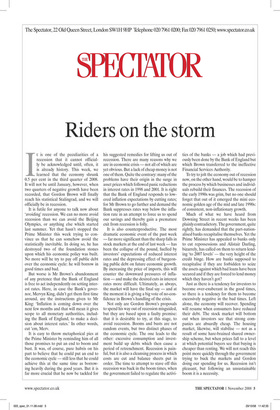Riders on the storm
It is one of the peculiarities of a recession that it cannot officially be acknowledged until, often, it is already history. This week, we learned that the economy shrunk 0.5 per cent in the third quarter of 2008. It will not be until January, however, when two quarters of negative growth have been recorded, that Gordon Brown will finally reach his statistical Stalingrad, and we will officially be in recession.
It is futile for anyone to talk now about ‘avoiding’ recession. We can no more avoid recession than we can avoid the Beijing Olympics, or anything else which started last summer. Yet that hasn’t stopped the Prime Minister this week trying to convince us that he can somehow avoid the statistically inevitable. In doing so, he has destroyed two of the foundation stones upon which his economic policy was built. No more will he try to pay off public debt over the economic cycle: he will borrow in good times and bad.
But worse is Mr Brown’s abandonment of any pretence that the Bank of England is free to act independently on setting interest rates. Here, in case the Bank’s governor, Mervyn King, didn’t get them first time around, are the instructions given to Mr King: ‘Inflation is coming down over the next few months and that will mean it gives scope to all monetary authorities, including the Bank of England, to make a decision about interest rates.’ In other words, cut ’em, Merv.
It is easy to throw metaphorical pies at the Prime Minister by reminding him of all those promises to put an end to boom and bust. It was, of course, pure hubris on his part to believe that he could put an end to the economic cycle — still less that he could achieve this at the same time as borrowing heavily during the good years. But it is far more crucial that he now be tackled for his suggested remedies for lifting us out of recession. There are many reasons why we are in economic crisis — not all of which are yet obvious. But a lack of cheap money is not one of them. Quite the contrary: many of the problems have their origin in the surge in asset prices which followed panic reductions in interest rates in 1998 and 2001. It is right that the Bank of England responds to lowered inflation expectations by cutting rates; for Mr Brown to go further and demand the Bank suppresses rates way below the inflation rate in an attempt to force us to spend our savings and thereby gain a premature exit from recession is folly.
It is also counterproductive. The most dramatic economic event of the past week — far more significant than the sharp falls in stock markets at the end of last week — has been the collapse of the pound, fuelled by investors’ expectations of reduced interest rates and the depressing effect of burgeoning public debt on future economic growth. By increasing the price of imports, this will counter the downward pressures of inflation — and make the desired cuts in interest rates more difficult. Ultimately, as always, the market will have the final say — and at the moment it is giving a big vote of no-confidence in Brown’s handling of the crisis.
Not only are Gordon Brown’s proposals to spend his way out of recession misguided, but they are based upon a faulty premise: that it is desirable to try, at this stage, to avoid recession. Booms and busts are not random events, but two distinct phases of the economic cycle. The one leads to the other: excessive consumption and investment build up debts which then cause a period of retrenchment. Recession is painful, but it is also a cleansing process in which costs are cut and balance sheets put in order. The time to attempt to stave off this recession was back in the boom times, when the government failed to regulate the activi ties of the banks — a job which had previously been done by the Bank of England but which Brown transferred to the ineffective Financial Services Authority.
To try to jolt the economy out of recession now, on the other hand, would be to hamper the process by which businesses and individuals rebuild their finances. The recession of the early 1990s was grim, but no one should forget that out of it emerged the mini economic golden age of the mid and late 1990s: of consistent, non-inflationary growth.
Much of what we have heard from Downing Street in recent weeks has been plainly contradictory. The government, quite rightly, has demanded that the part-nationalised banks recapitalise themselves. Yet the Prime Minister has appealed to banks only to cut repossessions and Alistair Darling, bizarrely, has called on them to return lending ‘to 2007 levels’ — the very height of the credit binge. How are banks supposed to recapitalise if they are forbidden to seize the assets against which bad loans have been secured and if they are forced to lend money which they haven’t got?
Just as there is a tendency for investors to become over-exuberant in the good times, so there is a tendency for them to become excessively negative in the bad times. Left alone, the economy will recover. Spending will resume when consumers have reduced their debt. The stock market will bottom out when investors see that strong companies are absurdly cheap. The housing market, likewise, will stabilise — not as a result of some hare-brained shared ownership scheme, but when prices fall to a level at which potential buyers see that buying is cheaper than renting. We will not reach this point more quickly through the government trying to buck the markets and Gordon doing our spending for us. Recession isn’t pleasant, but following an unsustainable boom it is a necessity.


































































































 Previous page
Previous page